By Peter Pedroncelli
Mar 5, 2010 1:40:00 PM
City: Johannesburg
Surface: Grass
Capacity: 62,000
Ellis Park Stadium, or Coca-Cola Park, as it was recently renamed after sponsorship agreements, has been the stage for many unforgettable football matches in theSouth African domestic scene, as well as a few Bafana classics. Coca-Cola Park hosted the final, as well as the opening and closing ceremony of the Confederations Cup, amongst other matches at the venue.
The ground has undergone major changes ahead of the World Cup in preparation for the showpiece event. The west, south and north stands have been revamped with additional seating and a new roof added. New change rooms, VIP, media and medical facilities have all been added. In addition, a new entrance façade to the north stand has been built.
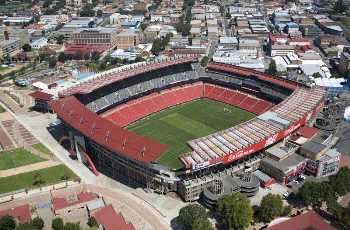
Coca-Cola Park Stadium Aerial View
A new, five-level car park has also been completed, which accommodates 1,200 cars. The revamped Coca-Cola Park Stadium seats 62,000 fans, increasing its capacity by almost nine percent from the previous 57,000.
With state-of-the-art media facilities, team whirlpools, top-class VIP areas for dignitaries, accessibility for disabled fans, a new pitch and a top-notch audio-visual setup to keep the fans informed during the game, Coca-Cola Park Stadium in Johannesburg is ready to welcome fans and players at the World Cup.
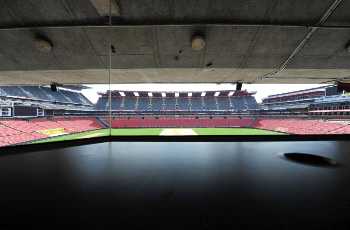
A View From The VIP Area
Facts
- More than 30 000 square metres of concrete was poured into the structure.
- More than 4 500 tons of reinforcement was used in the floor area of 48 000 square metres, and this does not include the seating areas.
- Nearly 500 000 pockets of cement went into the work done over 3,2 million man hours.
- There are about 3,1 million bricks laid at the stadium, 1372 windows of various sizes, more than 4,1 km of handrails and a total of 70 km piping for chairs.
- There are fifty 200 watt speakers, thirty 30 watt speakers & 245 speakers clustered around the stadium.
- Ellis Park is home to one of the country's most popular club, Orlando Pirates FC.
- The stadium saw South Africa crowned as Rugby World Cup champions in 1995.
- In 1987 Ellis Park Stadium was listed on the stock exchange.
History
The stadium was first built in 1928 as a rugby union stadium. It was demolished and rebuilt in 1982, but it was again used exclusively for rugby. It was named after JD Ellis, a Johannesburg city councilor who approved the use of the land for a stadium, setting aside 13 acres. The stadium was used for the finals of the 1995 IRB Rugby World Cup.
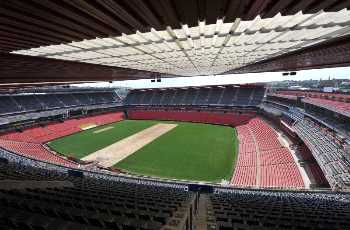
Coca-Cola Park Will See Seven World Cup Matches
Getting There
Parking is problematic due to inner-city congestion. The best option is the free park-and-ride facility, with pick-up points conveniently located around the city and buses constantly running during the event. The Bus Rapid system is another public transport option to use during the tournament, with a route that drops off passengers a few hundred metres away from the stadium, while traveling around the city to pick up and drop off passengers for a fee.
The Doornfontein and Ellis Park railway stations are in the process of being upgraded, adding another element of easy access transport to the stadium, but the safest and most comfortable remains the bus systems. A taxi cab service to one of the drop off points for the park and ride may be the best option to get to the stadium, while picking up a taxi cab from the park and ride facility after the game is also a good idea.
Plus and Minuses
Pluses
- The atmosphere at Coca-Cola Park is often electric, as the venue is used to hosting Johannesburg supporters who turn out for football and rugby in large numbers.
- The Coca-Cola Park sports complex is a huge area containing facilities for various sports codes, and the management of the venue are used to managing big events and large crowd capacities.
- The view from the stands at the stadium is fantastic, with fans able to get very close to the pitch and see their idols from close up, while even the seats at the top of the stadium seem to be towering right above the pitch due to the design.
- Security and infrastructure around the venue has been beefed up, with CCTV cameras and better lighting helping security to keep the area safe, while new transport infrastructure has been built.
- The stadium is not as modern as some of the recently built stadia around the country, but there is a great deal of tradition and history in the venue’s past.
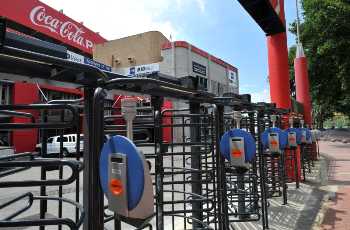
Fans Will Be Pouring Through These Gates In June
Minuses
- The congestion of the inner city makes traffic a realistic problem around the stadium.
- The open nature of the stadium design means that some of the higher seats in the stadium can be particularly cold in winter, so dress warmly.
- The venue is the home of the Lions rugby side, and the sport has a negative effect on the pitch, as a great deal of damage is done to the grass and the ground needs to be watered more often to promote growth and stop the ground from hardening.
Games to be Played
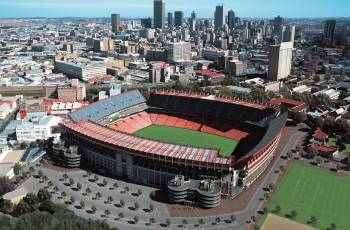
Coca-Cola Park Stadium In Johannesburg
Coca-Cola Park will have the fortune of hosting seven World Cup matches at the 2010 tournament; with five group stage matches being complimented by a Round of 16 encounter and a Quarter-Final match. The five group stage games will see Argentina take on Nigeria, Brazil clash with Korea DPR and Slovenia come up against USA, while Spain will match up against Honduras and defending champions Italy play against Slovakia.
Surface: Grass
Capacity: 62,000
Ellis Park Stadium, or Coca-Cola Park, as it was recently renamed after sponsorship agreements, has been the stage for many unforgettable football matches in the
The ground has undergone major changes ahead of the World Cup in preparation for the showpiece event. The west, south and north stands have been revamped with additional seating and a new roof added. New change rooms, VIP, media and medical facilities have all been added. In addition, a new entrance façade to the north stand has been built.

Coca-Cola Park Stadium Aerial View
A new, five-level car park has also been completed, which accommodates 1,200 cars. The revamped Coca-Cola Park Stadium seats 62,000 fans, increasing its capacity by almost nine percent from the previous 57,000.
With state-of-the-art media facilities, team whirlpools, top-class VIP areas for dignitaries, accessibility for disabled fans, a new pitch and a top-notch audio-visual setup to keep the fans informed during the game, Coca-Cola Park Stadium in Johannesburg is ready to welcome fans and players at the World Cup.

A View From The VIP Area
Facts
- More than 30 000 square metres of concrete was poured into the structure.
- More than 4 500 tons of reinforcement was used in the floor area of 48 000 square metres, and this does not include the seating areas.
- Nearly 500 000 pockets of cement went into the work done over 3,2 million man hours.
- There are about 3,1 million bricks laid at the stadium, 1372 windows of various sizes, more than 4,1 km of handrails and a total of 70 km piping for chairs.
- There are fifty 200 watt speakers, thirty 30 watt speakers & 245 speakers clustered around the stadium.
- Ellis Park is home to one of the country's most popular club, Orlando Pirates FC.
- The stadium saw South Africa crowned as Rugby World Cup champions in 1995.
- In 1987 Ellis Park Stadium was listed on the stock exchange.
History
The stadium was first built in 1928 as a rugby union stadium. It was demolished and rebuilt in 1982, but it was again used exclusively for rugby. It was named after JD Ellis, a Johannesburg city councilor who approved the use of the land for a stadium, setting aside 13 acres. The stadium was used for the finals of the 1995 IRB Rugby World Cup.

Coca-Cola Park Will See Seven World Cup Matches
Getting There
Parking is problematic due to inner-city congestion. The best option is the free park-and-ride facility, with pick-up points conveniently located around the city and buses constantly running during the event. The Bus Rapid system is another public transport option to use during the tournament, with a route that drops off passengers a few hundred metres away from the stadium, while traveling around the city to pick up and drop off passengers for a fee.
The Doornfontein and Ellis Park railway stations are in the process of being upgraded, adding another element of easy access transport to the stadium, but the safest and most comfortable remains the bus systems. A taxi cab service to one of the drop off points for the park and ride may be the best option to get to the stadium, while picking up a taxi cab from the park and ride facility after the game is also a good idea.
Plus and Minuses
Pluses
- The atmosphere at Coca-Cola Park is often electric, as the venue is used to hosting Johannesburg supporters who turn out for football and rugby in large numbers.
- The Coca-Cola Park sports complex is a huge area containing facilities for various sports codes, and the management of the venue are used to managing big events and large crowd capacities.
- The view from the stands at the stadium is fantastic, with fans able to get very close to the pitch and see their idols from close up, while even the seats at the top of the stadium seem to be towering right above the pitch due to the design.
- Security and infrastructure around the venue has been beefed up, with CCTV cameras and better lighting helping security to keep the area safe, while new transport infrastructure has been built.
- The stadium is not as modern as some of the recently built stadia around the country, but there is a great deal of tradition and history in the venue’s past.

Fans Will Be Pouring Through These Gates In June
Minuses
- The congestion of the inner city makes traffic a realistic problem around the stadium.
- The open nature of the stadium design means that some of the higher seats in the stadium can be particularly cold in winter, so dress warmly.
- The venue is the home of the Lions rugby side, and the sport has a negative effect on the pitch, as a great deal of damage is done to the grass and the ground needs to be watered more often to promote growth and stop the ground from hardening.
Games to be Played

Coca-Cola Park Stadium In Johannesburg
Coca-Cola Park will have the fortune of hosting seven World Cup matches at the 2010 tournament; with five group stage matches being complimented by a Round of 16 encounter and a Quarter-Final match. The five group stage games will see Argentina take on Nigeria, Brazil clash with Korea DPR and Slovenia come up against USA, while Spain will match up against Honduras and defending champions Italy play against Slovakia.
source: goal.com
 RSS Feed
RSS Feed Twitter
Twitter










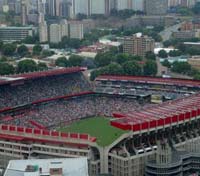











 Denmark
Denmark


















 SouthAfrica
SouthAfrica





0 comments:
Post a Comment